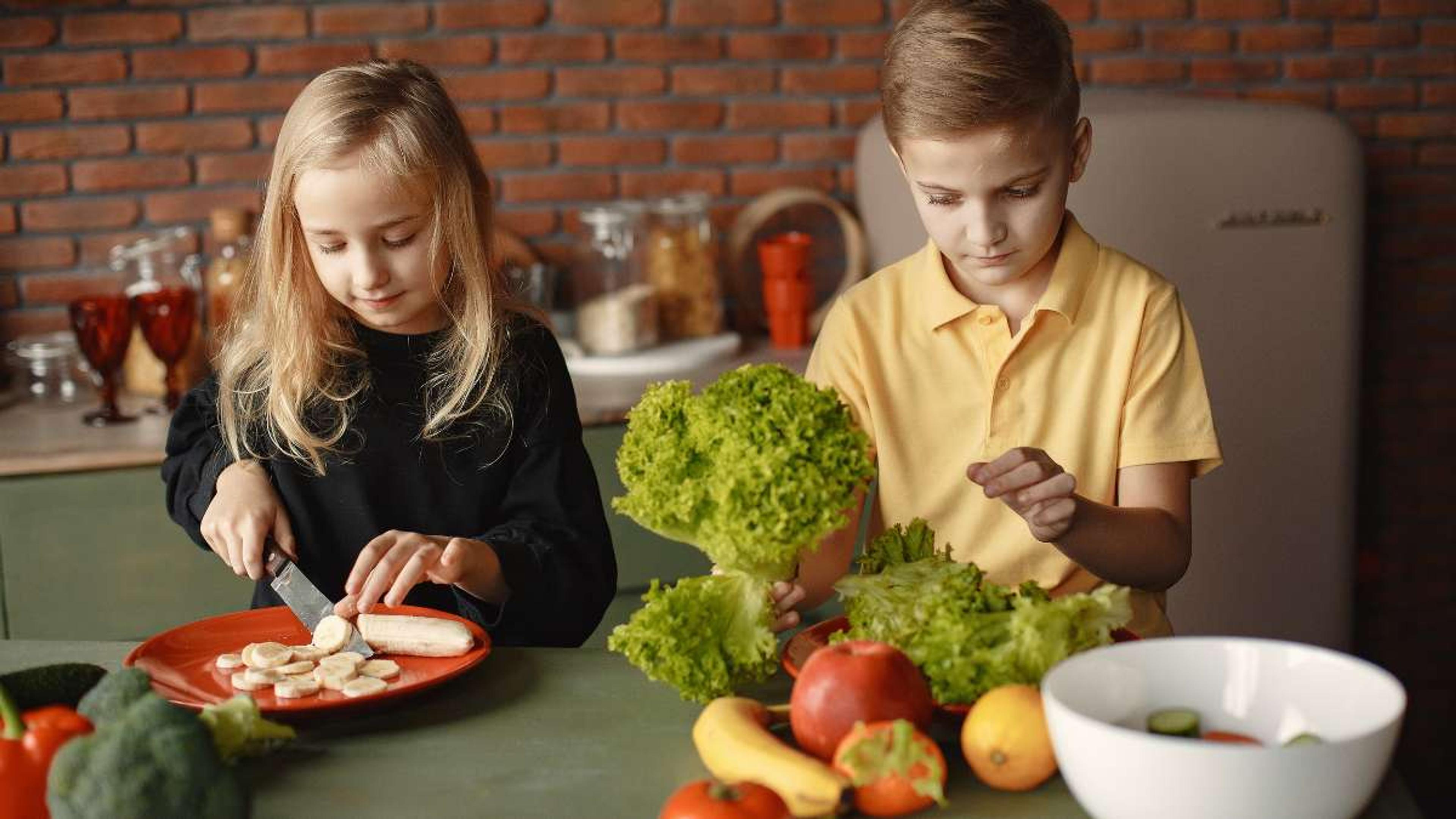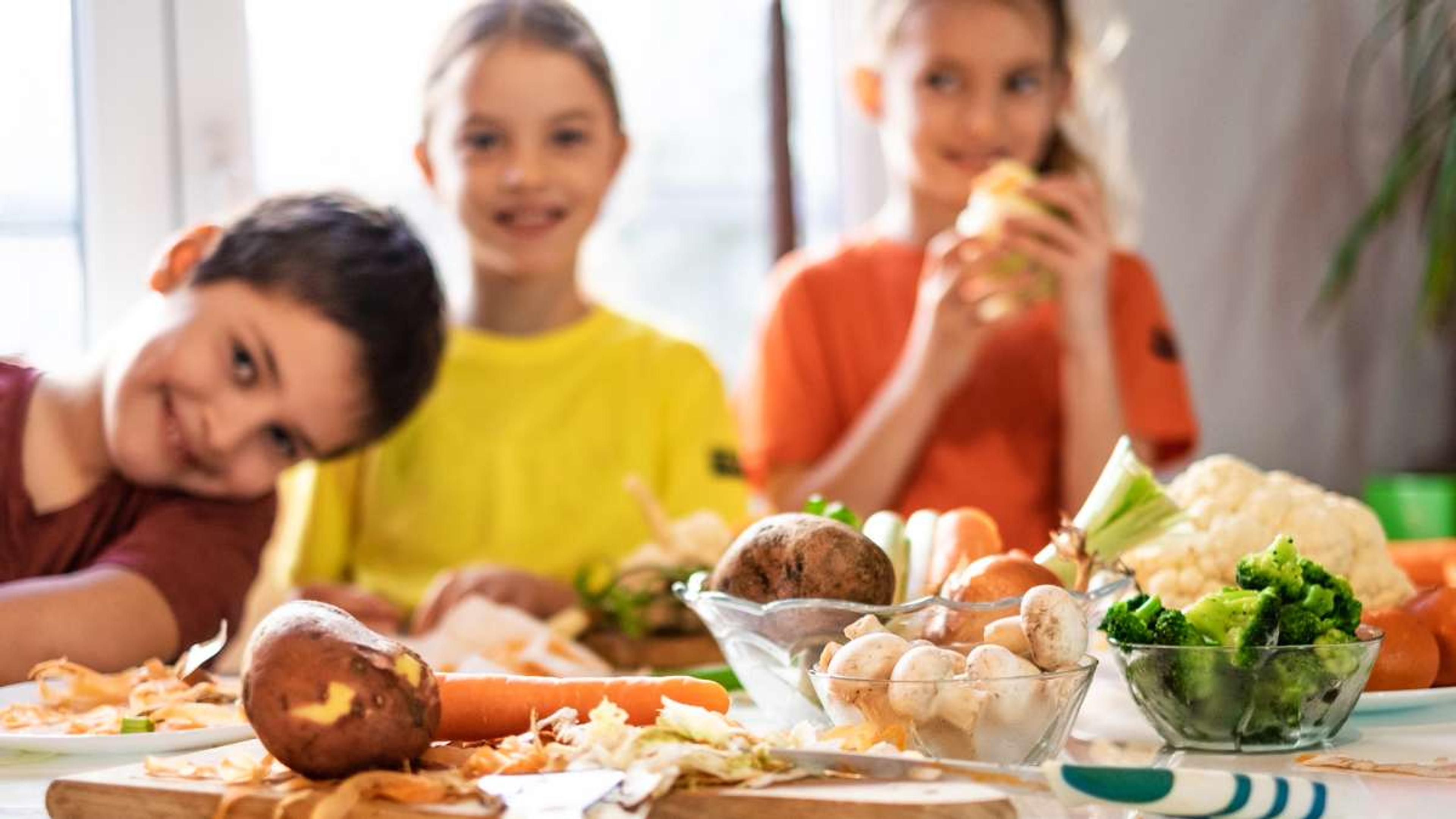Vegan Diet for Children: What You Need to Know

- Key Takeaways
- What Parents Need to Know About a Vegan Diet for Children
- Benefits of a Vegan Diet for Children
- Key Nutrients for Growing Children on a Vegan Diet
- Addressing Concerns and Myths
- Ensuring a Healthy and Balanced Vegan Diet for Children
- Consultation with Healthcare Professionals
- Conclusion
- FAQs
Are you curious about raising your child on a vegan diet? Studies show us that a vegan lifestyle can help kids avoid obesity and other health conditions. This article aims to inform parents about the nutritional needs of their children on a vegan diet, and how to adequately meet them.
Let's dig deep into the world of plant-based nutrition for little ones!
Key Takeaways
- A vegan diet for children can provide numerous health benefits, including lower risk of obesity, certain diseases like heart disease and type 2 diabetes, and positive impact on the environment.
- However, it requires careful planning to ensure that children get all the necessary nutrients for their growth and development. Key nutrients to pay attention to include protein, calcium and vitamin D, iron, vitamin B12, and omega-3 fatty acids.
- Protein can be obtained from plant-based sources like legumes, tofu, lentils, and soy products. Calcium and vitamin D can be found in fortified non-dairy milk alternatives or through exposure to sunlight. Iron-rich foods such as lentils and leafy greens should be included in the diet. Vitamin B12 can be obtained from fortified plant milks or cereals. Omega-3 fatty acids are present in plant-based sources like walnuts and flaxseeds.
- It is important to address concerns and myths surrounding a vegan diet for children by providing accurate information about potential nutrient deficiencies (such as vitamin B12) while debunking misconceptions about protein deficiency or negative impact on brain development.
What Parents Need to Know About a Vegan Diet for Children
A vegan diet for kids is safe and healthy. It has no meat, fish, dairy, eggs or honey. The main foods are whole grains, legumes like peas, nuts, seeds and all kinds of fruits and vegetables.
These foods offer lots of fiber, vitamin C and other good stuff that can protect them from getting sick.
But a vegan diet needs careful planning. A child's body grows fast so they need lots of nutrients to stay healthy. This includes protein that you get from meat and calcium found in milk or cheese.
Vegan diets may not give enough nutrition to babies and little ones so extra supplements might be needed, especially on nutrients vitamin B12 & vitamin D. But, don't worry, there are vegan food sources you can get these nutrients from. It is important to know your child's nutrient profile to understand if they need extra supplements. So, work with a dietitian or a healthcare professional who knows about vegan diets for children to make sure they're getting what they need.
Be sure to include iron-rich foods like spinach and lentils in your child’s meals too– this helps keep their blood strong! And don't forget sources of Vitamin B12 which is key for keeping nerves working right – it can be found in certain cereals or soy products.
Benefits of a Vegan Diet for Children
A vegan diet for children offers increased consumption of beneficial plant-based nutrients, lower risk of certain diseases, positive impact on the environment, and promotes empathy towards animals. A well-planned vegan diet can be suitable for children and offer various benefits, similar to those for adults. Consulting a nutritionist can help ensure that your child is receiving all the necessary nutrients for their growth and development. Here are some potential benefits of a vegan diet for children when adequately planned:

Increased consumption of beneficial plant-based nutrients
Eating a vegan diet can fill your child's plate with many good nutrients. Vegan children often eat more fiber, vitamin C, folate, carotenoids, unsaturated fats, magnesium, and calories. These key parts of healthy growth come from fruits, vegetables like kale and broccoli, legumes such as lentils and whole grains.
A vegan diet encourages the consumption of nutrient-dense foods like fruits, vegetables, whole grains, nuts, and seeds, providing children with a strong foundation of vitamins, minerals, and antioxidants, giving children an early exposure to nutrient-rich whole plant foods. It is important to note that parents should consult with their pediatrician to ensure their child's nutrient intake is within the normal range for their age and development.
They also get less fat in their meals. A vegan diet, which is an alternative to an omnivorous diet, has a variety of foods rich in plant-based nutrients which are good for health. Spinach helps with iron absorption and bone health receives a boost from calcium found in bok choy or fortified soy products.
Adding walnuts or flaxseeds to meals gives them omega-3 fatty acids that help the heart stay strong. This means on top of eating tasty food, these kids are getting what they need to grow tall and fit!
A healthy child - Lower risk of certain diseases
Eating only plant-based foods, including breast milk, can help kids stay healthy. Vegan children often have less body fat, lower blood sugar, and less cholesterol. This type of diet may protect them from heart diseases in the future.
- Lower Risk of Obesity: A well-balanced vegan diet, rich in whole plant foods, can contribute to maintaining a healthy weight in children.
- Heart Health: Plant-based diets can help children develop heart-healthy eating habits by avoiding saturated fats and cholesterol found in animal products.
- Reduced Risk of Type 2 Diabetes: With the food options available for us, it is no surprise that children develop diabetes at very ages. A vegan diet can promote healthier insulin sensitivity and reduce the risk of developing type 2 diabetes in children.
It might also keep away diabetes and some types of cancer when they grow into adults. So, vegan food is not just good for now; it keeps them safe later too, especially during adolescence.
Positive impact on the environment
A vegan diet can have a positive impact on the environment. It is more sustainable because it requires fewer resources like land, water, and energy compared to diets that include meat. Educating children about the environmental impact of food choices from an early age can instill a sense of responsibility towards the planet.
Plant-based diets help reduce greenhouse gas emissions and contribute to combating climate change. By adopting a vegan diet from a young age, children of vegan mothers can play their part in protecting the environment for future generations who are concerned about the impact of their food choices.
Promoting empathy towards animals
Choosing a vegan diet for children can help promote empathy towards animals. Research shows that people who follow a vegan lifestyle tend to have stronger feelings of compassion and respect for animal rights.
By teaching children about the impact of their food choices on animals, they develop a sense of empathy and understanding. This can lead them to make more With an early exposure to nutrient-rich whole plant foodsconscious decisions about not only what they eat but also how their choices affect the well-being of animals.
Ultimately, adopting a vegan diet can be an effective way to instill values of compassion and empathy in children from a young age.
Key Nutrients for Growing Children on a Vegan Diet
Growing children on a vegan diet require essential nutrients such as protein, calcium and vitamin D, iron, vitamin B12, and omega-3 fatty acids to support their overall growth and development.

Protein
Protein is an important nutrient for growing children on a vegan diet. It helps with their growth and development. Vegan children can get protein from plant-based sources such as legumes, tofu, lentils, and soy products.
It is essential to ensure that they have enough protein in their meals to support their needs. Some studies have found that vegan children may have lower proportions of energy from protein compared to non-vegan children, so it's important to pay attention to this nutrient. Another way to overcome is the option of considering a vegetarian diet instead of a vegan diet if your child is interested in eating eggs. This will avoid for you to opt for meat sources.
By including a variety of plant-based protein sources in their diet, parents can help meet their child's protein needs for healthy growth and development without relying on animal products.
Calcium and Vitamin D
Calcium and vitamin D are two essential nutrients for growing children on a vegan diet. Calcium is important for developing strong bones and teeth, while vitamin D helps the body absorb calcium and supports the immune system.
Vegan children may have lower levels of these nutrients compared to those who consume animal products, so it's crucial to include plant-based sources in their diet. Foods like fortified non-dairy milk, tofu, leafy greens (such as kale and spinach), and almonds are good sources of calcium.
Vitamin D can be obtained from exposure to sunlight or through fortified foods like soy milk or cereals. By ensuring an adequate intake of both calcium and vitamin D, parents can help support their child's bone health and overall growth.
Iron
Iron is an important nutrient for children on a vegan diet, as it supports their growth and development. However, vegan children may have lower iron intake compared to those who consume meat, if vegan sources of iron are not consumed sufficiently.
Iron from plant-based foods is not absorbed as well by the body as iron from animal products. To ensure sufficient iron levels, vegans can include foods like legumes, whole grains, fortified cereals, and dark leafy greens in their diet.
It's crucial to address any iron deficiency in vegan children because it can lead to impaired growth and development.
Vitamin B12
Vitamin B12 is an essential nutrient that children on a vegan diet need to pay attention to. It's important for their growth and development. However, it can be a bit tricky for vegans to get enough of this vitamin because it mainly comes from animal products. If you plan a vegetarian diet, you can include eggs in their meals, giving them sufficient amounts of vitamin B12 instead of fish, seafood and poultry.
So, parents need to make sure their children are getting enough vitamin B12 through fortified foods like plant milks, soy products, and breakfast cereals. A study found that vegetarian and vegan children had lower levels of vitamin B12 compared to those who ate meat.
This emphasizes the need for proper supplementation in vegan children to prevent deficiency. Making sure your child gets enough of this nutrient is crucial for their overall health on a vegan diet.
Omega-3 fatty acids
Omega-3 fatty acids are important for the growth and development of children on a vegan diet. These healthy fats can be found in plant-based sources like algae, walnuts, hemp, chia seeds, and flaxseeds.
While it's true that vegan diets may have higher levels of omega-6 fatty acids that can inhibit the conversion of linolenic acid to DHA and EPA, research suggests that people who follow vegan diets generally have adequate intake of omega-3 fats.
However, more data is needed to assess the specific intake and nutrient status in vegan children. It's worth noting that ALA, a type of omega-3 fatty acid, is also present in some fish and meat along with plant sources.
Addressing Concerns and Myths
Addressing concerns and myths surrounding a vegan diet for children is crucial in order to provide accurate information and alleviate any misconceptions regarding the nutritional adequacy of this plant-based eating pattern.

Common nutrient deficiencies in vegan children
- Vegan children are at risk of deficiencies in nutrients such as vitamin B12, iron and vitamin D.
- Vitamin B12 deficiency is the biggest concern for vegan children, as it is primarily found in animal-derived foods.
- Omega-3 fatty acids are important for brain development and may require supplementation or consumption of plant-based sources like flaxseeds or walnuts.
- Calcium and vitamin D deficiencies can lead to poor bone health if not adequately managed through fortified plant-based milk alternatives or supplements.
- Iron deficiency can be a concern due to the absence of heme iron found in animal products, but can be addressed by consuming iron-rich plant foods such as lentils and leafy greens.
- Zinc deficiency may also occur in vegan children, but can be prevented by including legumes, whole grains, and fortified cereals in their diet.
Protein deficiency myth
Protein deficiency in vegan children is a common myth. Some people believe that kids on a vegan diet won't get enough protein, but this is not true. Studies have shown that vegan babies and children can easily meet their protein needs through plant-based foods like legumes, tofu, lentils, and soy products.
The idea of worldwide protein deficiency actually started from a UN report in the 1960s, but it has been debunked since then. Plant-based diets for kids are not deficient in protein or other important nutrients - it's just important to make sure they're getting a variety of foods to ensure they're getting everything they need to grow and develop properly.
(Source: IMPORTANT FACTS - Vegan babies and children can get enough protein)
Brain development myth
There is a common myth that a vegan diet can negatively impact brain development in children. However, this is not supported by scientific evidence. Studies have shown that a well-planned plant-based diet can provide all the necessary nutrients for proper growth and development.
Vegan diets can be rich in essential fatty acids, vitamins, minerals, and antioxidants which are beneficial for the brain. Additionally, there are many vegan sources of omega-3 fatty acids such as chia seeds, flaxseeds, and walnuts which contribute to brain health.
So parents can rest assured that a properly balanced vegan diet will not hinder their child's brain development or cause any long-term damage.
Ensuring a Healthy and Balanced Vegan Diet for Children
To ensure a healthy and balanced vegan diet for children, it is important to focus on meal planning and offer a variety of food choices. Additionally, supplementation and fortified foods can help address any potential nutrient deficiencies.
Remember not to force Veganism onto your child; instead, provide education and guidance while allowing them to make their own choices regarding their diet.

Meal planning and diversified food choices
To ensure a healthy and balanced vegan diet for children, it is important to focus on meal planning and have a variety of food choices. Here are some key points to keep in mind:
- Include a variety of fruits and vegetables: Aim to incorporate different types and colors of fruits and vegetables in your child's meals. This will provide them with a wide range of vitamins, minerals, and antioxidants.
- Include whole grains: Opt for whole grain options such as brown rice, quinoa, whole wheat bread, and oats. These are rich in fiber and can help with digestion.
- Consider supplementation if needed: Some nutrients like vitamin B12 may be challenging to obtain from solely plant-based sources. Talk to your healthcare professional about whether your child needs any supplements to ensure they're getting all the necessary nutrients.
- Allow for treats and fun foods: While it's important to focus on nutrient-dense foods, allowing your child to enjoy vegan treats and fun foods in moderation can help them maintain a healthy relationship with food.
Supplementation and fortified foods
Supplementation and fortified foods are important for ensuring that vegan children receive all the necessary nutrients. Here are some ways to meet their nutritional needs:
- Vitamin B12: As vegan diets lack animal products, it is crucial to provide a reliable source of vitamin B12. This can be achieved through supplements or fortified foods such as plant-based milks, breakfast cereals, and nutritional yeast.
- Calcium and Vitamin D: Since dairy products are excluded from a vegan diet, it's essential to include calcium-rich alternatives like fortified plant-based milk, tofu, leafy greens (such as kale and spinach), and sesame seeds. Additionally, vitamin D supplementation is recommended, as it aids in calcium absorption.
- Iron: Plant-based sources of iron include lentils, chickpeas, tofu, beans, quinoa, and fortified cereals. Combining these with foods rich in vitamin C (like oranges or bell peppers) can enhance iron absorption.
- Omega-3 Fatty Acids: Flaxseeds, chia seeds, walnuts, and hemp seeds are excellent sources of omega-3 fatty acids for vegans. Alternatively, an algae-based supplement can be used.
- Iodine: Since iodine may be lacking in vegan diets due to limited intake of iodized salt and seafood, a supplement or iodized salt in cooking can help meet requirements.
Do not force Veganism on your child
It is important to respect your child's autonomy and dietary preferences. Forcing veganism on your child without considering their nutritional needs and well-being can lead to deficiencies in essential nutrients.
It is advisable to have open and honest conversations with your child about their food choices and educate them on the importance of a balanced diet. By providing a variety of foods that meet their nutritional requirements, you can support your child in making informed decisions about their diet while ensuring they receive the necessary nutrients for healthy growth and development.
Consultation with Healthcare Professionals
It is essential for parents to consult with healthcare professionals, such as a paediatrician or dietitian, when introducing a vegan diet to their children. These experts can provide guidance on meeting nutrient needs, monitor growth and development, and address any concerns or questions that may arise.
To learn more about the importance of professional consultation in ensuring a healthy vegan diet for children, continue reading.

Working with a paediatrician or dietitian
It is essential for parents to work closely with a paediatrician or dietitian when considering a vegan diet for their child. These healthcare professionals can provide guidance and support throughout the process.
They have the knowledge and expertise to ensure that all key nutrients needed for proper growth and development are being met through a vegan diet. Paediatricians and dietitians can monitor nutrient levels, assess growth and development, address any concerns or deficiencies, and make recommendations for appropriate supplementation if necessary.
Their role is crucial in helping parents navigate the unique challenges of providing a healthy and balanced vegan diet for their children.
Monitoring nutrient levels, growth and development
Monitoring nutrient levels, growth, and development is crucial for ensuring the health and well-being of children on a vegan diet. Here are some important factors to consider:
- Regular check-ups: Schedule regular visits with a healthcare professional, such as a pediatrician or dietitian, who can monitor your child's overall health and development.
- Nutrient testing: Periodically test your child's nutrient levels to identify any deficiencies or imbalances that may arise from their vegan diet.
- Growth tracking: Monitor your child's growth patterns, including height and weight, to ensure they are meeting appropriate milestones for their age group.
- Assessing key nutrients: Pay close attention to specific nutrients that may require extra consideration in a vegan diet, such as protein, calcium, vitamin D, iron, and vitamin B12.
- Adjustments as needed: Work with healthcare professionals to make necessary adjustments to your child's diet or incorporate supplements if there are concerns about nutrient deficiencies.
Conclusion
In conclusion, a well-planned vegan diet can provide numerous health benefits for children. By focusing on key nutrients and ensuring a balanced diet, parents can support their child's growth and development while promoting compassion for animals and the environment.
Consultation with healthcare professionals is important to monitor nutrient levels and ensure optimal health. With proper attention to nutrition, vegan diets can be a healthy choice for children.
FAQs
1. Is a vegan diet safe for children?
Yes, a well-planned and balanced vegan diet can be safe and healthy for children, ensuring they receive all the necessary nutrients for growth and development.
2. What foods should I include in a vegan diet for my child?
A vegan diet for children should include a variety of fruits, vegetables, whole grains, legumes, nuts, and seeds to provide essential nutrients like protein, iron, calcium, vitamin B12, and omega-3 fatty acids.
3. Can my child meet their nutritional needs on a vegan diet?
Yes, with proper planning and attention to nutrient-rich food choices or supplementation when needed (e.g., vitamin B12), children can meet their nutritional needs on a vegan diet.
4. Are there any potential risks of a vegan diet for children?
While rare if well-balanced and monitored by healthcare professionals or registered dietitians who specialize in pediatric nutrition-making sure the child receives all the necessary nutrients is important to avoid deficiencies.

